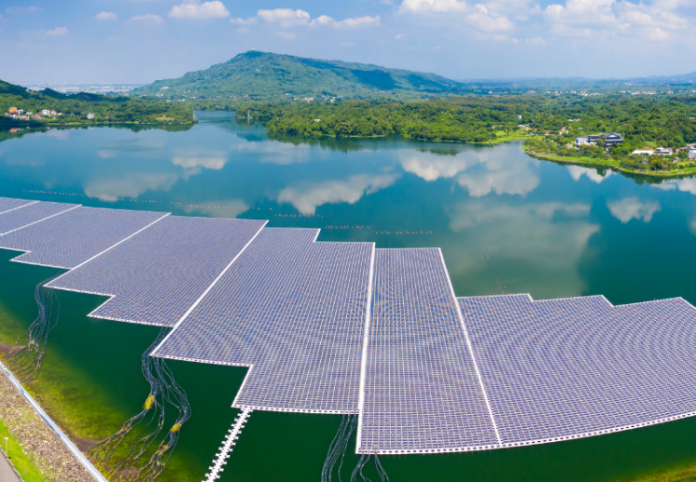The Central Electricity Regulatory Commission (CERC) has ruled that it does not have the jurisdiction to adjudicate a petition filed by the Solar Energy Corporation of India (SECI) for the adoption of tariff for a 150 MW floating solar project in Uttar Pradesh.
It ruled that mere involvement of SECI as an interstate trading licensee and ‘intermediary procurer’ does not render the generating company to qualify as a ‘composite program’ for generation and sale of power in more than one state.
The CERC, however, did not go into the merits of the case but limited itself to decide whether it had the jurisdiction to adjudicate the petition or not. The petitioner was free to approach an ‘Appropriate Commission’ for adjudication of its petition for tariff adoption, CERC said.
SECI had floated the tender for the project in March 2018 and had raised the tendered capacity from 100 MW to 150 MW in April 2018.
Background
On September 6, 2018, SECI, on behalf of the Uttar Pradesh Power Corporation Limited (UPPCL), had issued a Request for Selection (RfS) along with draft power purchase agreement (PPA) and power sale agreement (PSA) documents for selection of developers for setting up a 150 MW grid-connected floating solar project at the Rihand Dam in Uttar Pradesh in four packages.
In the reverse auction for Package-B held on November 27, 2018, Shapoorji Pallonji Infrastructure Company was awarded 50 MW at the tariff of ?3.29 (~$0.043)/kWh.
For Packages A and C, since only single bids were received from ReNew Solar Power at ?3.31 (~$0.044)/kWh, there was no occasion for conducting an e-reverse auction. The tariff was later negotiated to ?3.29 (~$0.043)/kWh.
SECI agreed to sell 150 MW of solar power to the distribution licensee, UPPCL, at the tariff of ?3.29 (~$0.043)/kWh plus a trading margin of ?0.07 ~$0.0009)/kWh.
SECI approached the CERC for the adoption of tariffs while also considering the issues listed below.
PPAs and PSA entered into by SECI as the nodal agency of the central government and as an inter-state trading licensee are considered as a ‘composite scheme’ – a program for the generation and sale of electricity in more than one state.
Clauses in the PSA allow SECI to sell UPPCL’s allocation of solar power to third parties including any licensee. The PPAs executed with the developers state CERC as the ‘Appropriate Commission’.
As per the provisions of the PSA, in the event of a bill amounting to ?250 million (~$3.35 million) is unpaid to the extent of ?100 million (~$1.34 million), SECI would have the right to divert and sell UPPCL’s allocation to third parties. SECI argued that it was entitled to sell the power outside the state, and the project qualified as one under the ‘composite scheme.’
Commission’s Analysis
According to the CERC, in the case of the 150 MW grid-connected floating solar projects to be developed at the Rihand Dam in the Sonbhadra district of Uttar Pradesh, SECI was roped in as the intermediary procurer by UPPCL for conducting the tariff-based competitive bidding. The bidding was also under the condition that UPPCL would be procuring the entire 150 MW from this project. UPPCL has also signed the PSA for this project. In this situation, the matter for a ‘composite scheme’ does not arise. Just because there is a provision in the PSA that SECI can sell the power to a third party or a licensee outside the state, it does not call for the intervention of CERC.
Also, SECI’s claim that in the event of a bill amounting to ?250 million (~$3.35 million) is unpaid to the extent of ?100 million (~$1.34 million), it would have the right to divert and sell UPPCL’s allocation to third parties, only triggers when such an eventuality arises and not otherwise.
CERC observed that where a procurer is a single distribution licensee, the Appropriate Commission for the adoption of tariffs is the State Electricity Regulatory Commission of the concerned state where the distribution licensee is located. In the case of combined procurement where the distribution licensees are located in more than one state, the Appropriate Commission is the Central Commission.
The present case does not involve combined procurement where the distribution licensees are located in more than one state where the Appropriate Commission would be the CERC. So, SECI’s argument that CERC is the Appropriate Commission, in this case, is rejected. CERC also said that it does not have jurisdiction in this case due to which it has not examined the merits of the case.
Commenting on the CERC order, attorney Aditya K Singh said, “Until the pronouncement of this order, it was an accepted proposition that CERC would adopt tariffs for all such bids invited by SECI and NTPC. CERC had not appreciated objections of distribution companies (DISCOMs) on the ground of jurisdiction and had adopted tariffs and passed the change in law orders of SECI/NTPC bid projects.”
He said that the distinction brought by CERC between earlier orders and the instant matter does not appear to be sustainable.
“I believe if CERC or generators rely solely on the ‘Composite Program’ argument before the Appellate Tribunal of Electricity (APTEL), then there are greater chances that all change in law orders of CERC will be reversed,” he said.
Subscribe to Mercom’s real-time Regulatory Updates to ensure you don’t miss any critical updates from the renewable industry.






